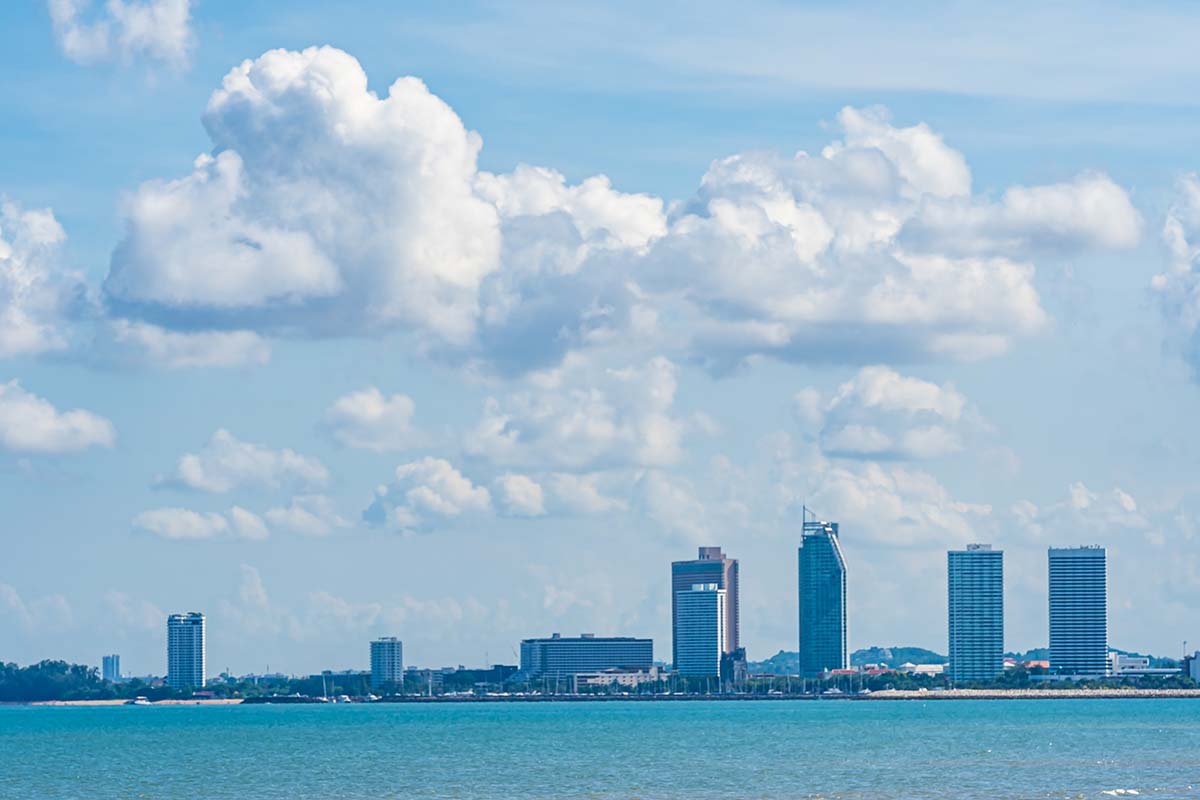
In 2024, foreigners will be able to purchase real estate in Thailand, including condominiums with freehold status. These are commonly referred to as condominiums, where private ownership extends to the apartments and the common areas are owned jointly by all residents. It's important to note that foreigners cannot own more than 49% of the total condominium units in a condominium complex.
Content:
- The process of buying property in Thailand: Main stages
- Remote purchase of real estate in Thailand
- Buying property in Thailand: Stages of the process
- Purchase real estate in Thailand: Prices
- Property taxes in Thailand
- Let us help you buy real estate in Thailand!
The situation is different with private homes. In modern villa and townhouse developments, condominiums are also available. However, freehold ownership only covers the building itself, not the land underneath, which cannot be sold to foreigners. Instead, it can be leased on a long-term basis. The standard lease for such land is 30 years, with the option to renew twice for 30 years each time. Developers often willingly extend these terms. This brings the total land use period to 90 years.
Foreign buyers interested in real estate in Thailand can consider leasehold projects. Apartments and houses of this type, along with land, are purchased with a 30-year leasehold with the option of a double extension. Properties in such condominiums are more affordable than freehold projects. If the investment house is located in a popular resort area, it can quickly pay itself back.
For those planning to purchase houses or apartments in Thailand for permanent residence, long-term ownership can be an excellent alternative to traditional renting, as the owner has more rights than a tenant. Such properties can be inherited, sold, gifted, or rented out.

The process of buying property in Thailand: Main stages
Let's look at the process of buying real estate in Thailand. Today, transactions can be conducted remotely or in person. Since there are restrictions on foreigners in the Kingdom, it's advisable to use specialized agencies. Many companies that work with foreign clients offer translation services and complete transaction support.
The main stages of acquiring a house in Thailand are as follows:
- Select an apartment or house. Determine whether you are willing to take a long-term lease at a more affordable price or pay more to acquire private ownership.
- Reserve the chosen object by signing a reservation agreement and paying a deposit, usually no more than 30% of the total amount.
- If you're considering options on the secondary market, it's crucial that the broker conduct a legal review of the seller's documents. Also, carefully inspect the technical condition of the building: the state of the utilities, roof, floors, bathrooms, etc.
- Signing of the contract of sale, which specifies the obligations of both parties, the characteristics of the asset and the responsibility for the payment of taxes. The buyer receives a draft of the contract in English and Thai. After review, one copy is sent to the Land Department. It's important to sign the contract within 30 days of the reservation.
- The remaining amount is transferred to the seller's account, either through a foreign or local bank. Taxes and fees are also paid at this stage. Typically, the buyer bears the cost of bank transfer fees, while other expenses fall on the seller. If you are buying from a developer, there may be additional charges such as depreciation fund, maintenance of common areas, installation of meters, telephone charges, etc.
- Submit the necessary documents to the Land Department to complete the transaction (passports, marriage certificates, parental information, etc.).
- Register the transaction with the Land Department and complete the final version of the Purchase and Sale Agreement.
- Obtain a certificate of ownership (title deed).
Remote purchase of real estate in Thailand
To purchase real estate in Thailand, a foreign buyer is not required to visit the Kingdom. Since the time of the pandemic, the country has established a real estate transactions process without the direct presence of the buyer, facilitated by intermediaries. Typically, brokers or lawyers from real estate agencies play the role of intermediaries, offering complete transaction support, from selecting the house to finalizing ownership rights.
Remote transactions are often favored by investors who purchase apartments and villas in Thailand to rent it out. It is advisable to choose fully developed properties in residential complexes with amenities. Another good option is a condominium with hotel services.
A developer or management company may offer a full management contract for the condominium. In this case, the company takes care of all procedures related to renting out the asset, including finding tenants, move-in preparation, minor cosmetic repairs, technical maintenance, and more. The owner, in turn, receives a fixed income that typically ranges from 5% to 7% annually, but in some complexes located in popular resort areas, the profit can be higher.
Buying property in Thailand: Stages of the process
The remote real estate purchase process in Thai consists of several stages. Let's explore them in more detail using the example of purchasing an apartment in a condominium under construction:
- Selecting it for future purchase through specialized portals or a specific developer's website.
- Reserve it, prepare supporting documents, and sign a contract with the developer, translated into the buyer's language.
- Deposit payment by the buyer through a bank account.
- After receiving the funds, the developer prepares a contract for full payment of the asset.
- Transfer the remaining amount to the developer's account.
- Once the building is ready for occupancy, the buyer or his representative inspects the apartment and signs an acceptance certificate. The title deed is then processed. All procedures can be carried out independently or through an intermediary, such as a broker or other trusted person.
Purchase real estate in Thailand: Prices
To find out the cost of housing in Thailand, you can visit the catalog on our website, where a large number of offers from various developers and real estate agencies are collected.
Location has a significant impact on the price of apartments and houses. Small apartments and studios are available from $30,000, often located away from the beach in less touristy areas. These apartments are usually sold without the right to ownership.
On the popular island of Phuket, favored by foreigners, housing costs are higher. Prices for apartments here start at an average of $100,000. For this amount you can purchase modern apartments with stylish finishes in a condominium with amenities. The island has a well-developed infrastructure, and many people invest in property here for rental purposes.
The price of apartments and houses also depends on various parameters such as the total area, the type of floor plan, the view from the windows and the presence of hotel services and amenities in the residential complex.
Property taxes in Thailand
Along with utility costs, owners should not forget about taxes in Thai. If you decide to sell the property after 5 years of ownership, you will have to pay a government fee of 0.5% of the value of the asset. If the ownership period is less than 5 years, an additional business tax of 3.3% will be applied.
If you make a profit on the resale, it is subject to progressive tax rates ranging from 5% to 35%. The higher the profit, the higher the tax.
There is also a transaction fee of 2% of the assessed value of the house, usually paid by the new owner. Sometimes the amount is split between the buyer and seller, or other arrangements are made by mutual agreement.
There is also an income tax of 1%, usually paid by the seller. It's important to note that most sales taxes are calculated based on the value of the property. There is an assessed value and an actual value, and taxes are usually calculated on the higher of the two.
Investors who rent out an asset but are not tax residents of the country pay 15% of the rental income. If the ownership belongs to a tax resident with a Taxpayer Identification Number (TIN), the tax is calculated on a progressive scale ranging from 3% to 35%. A foreigner can obtain a TIN by staying in the Kingdom for more than 180 days per year.
Most Thai taxes are applied on a progressive scale, meaning that the more expensive the purchase and the higher the rental income, the more tax will be owed.

Let us help you buy real estate in Thailand!
Today many new developments complexes are being built in Pattaya, Phuket, Bangkok and other popular Thai cities and provinces. Developers are offering the opportunity to buy property during construction at an advantageous price with the option to pay for the purchase in installments without interest. Such properties sell out quickly. With our website, you will always be informed about new offers and have the opportunity to buy the most attractive option directly from the developer. We do not charge commissions as we work directly with sellers and developers.
The catalog is constantly updated with new offers from reputable developers and real estate agencies. With advanced search filters, you can easily find the optimal option in for your future purchase of property in Thailand.

